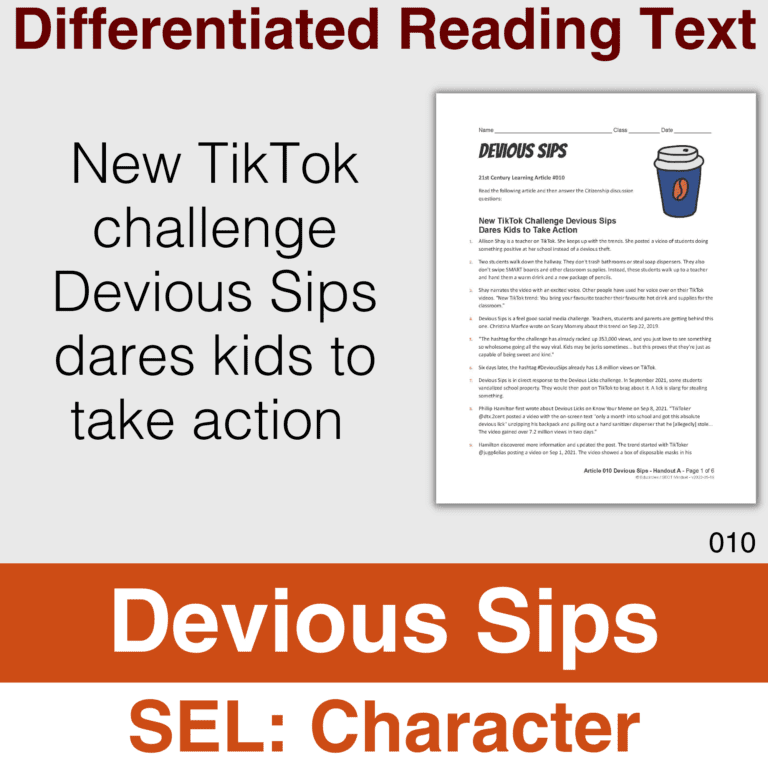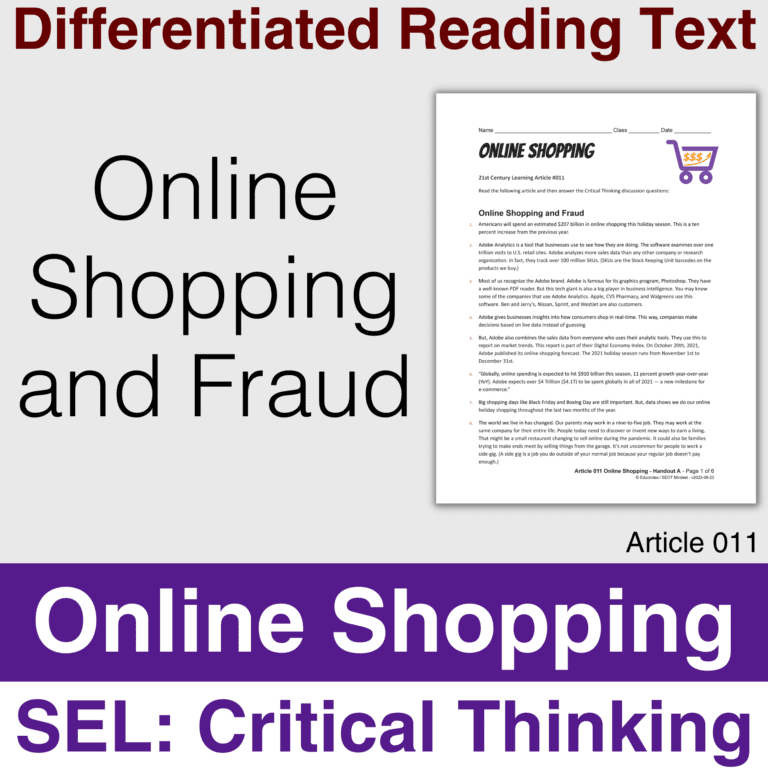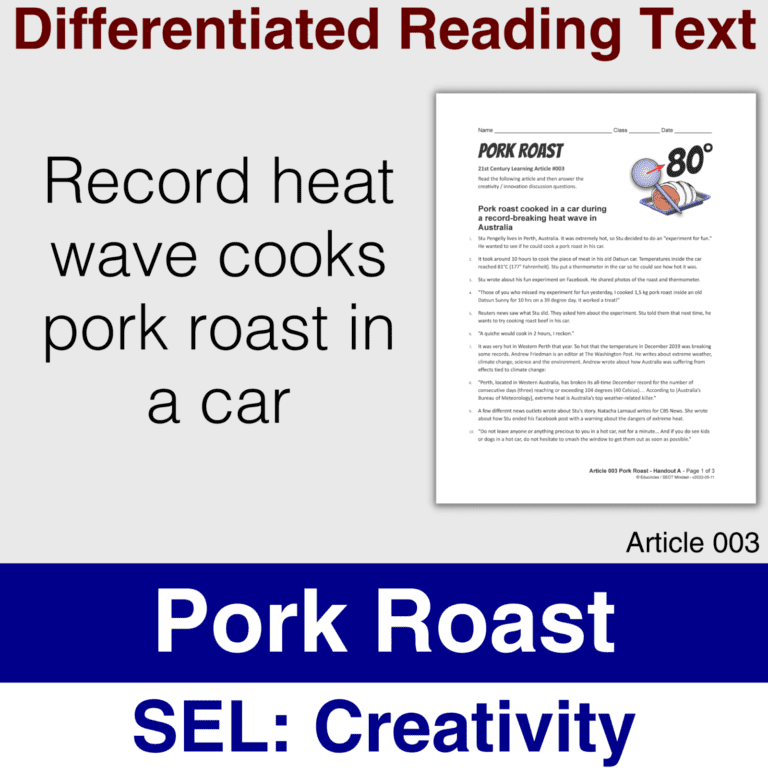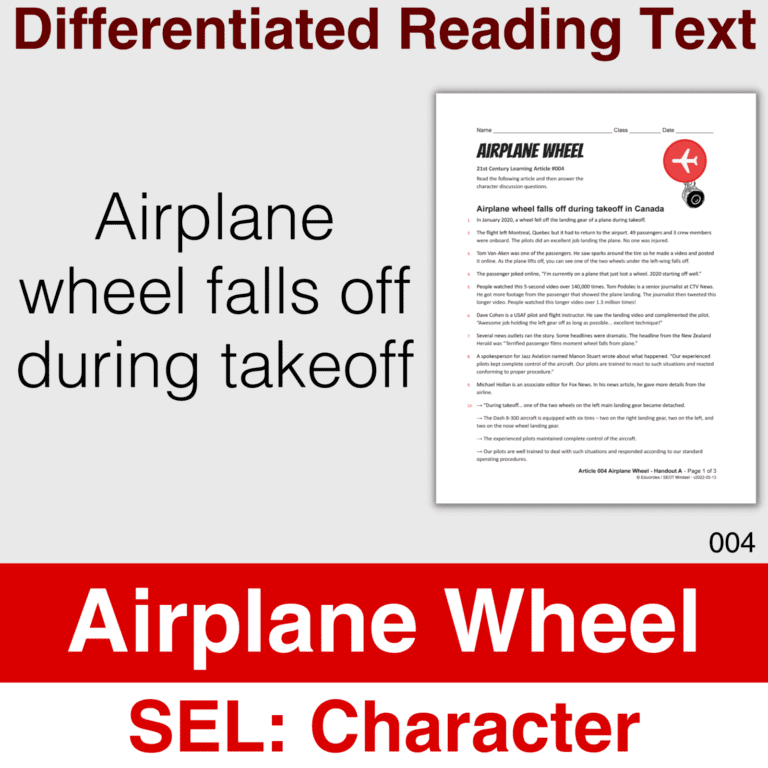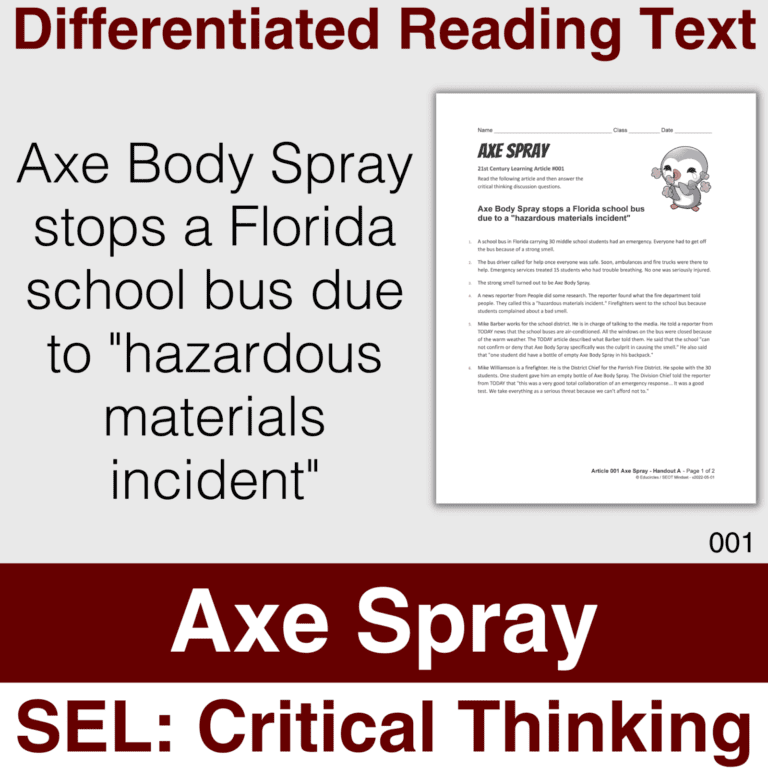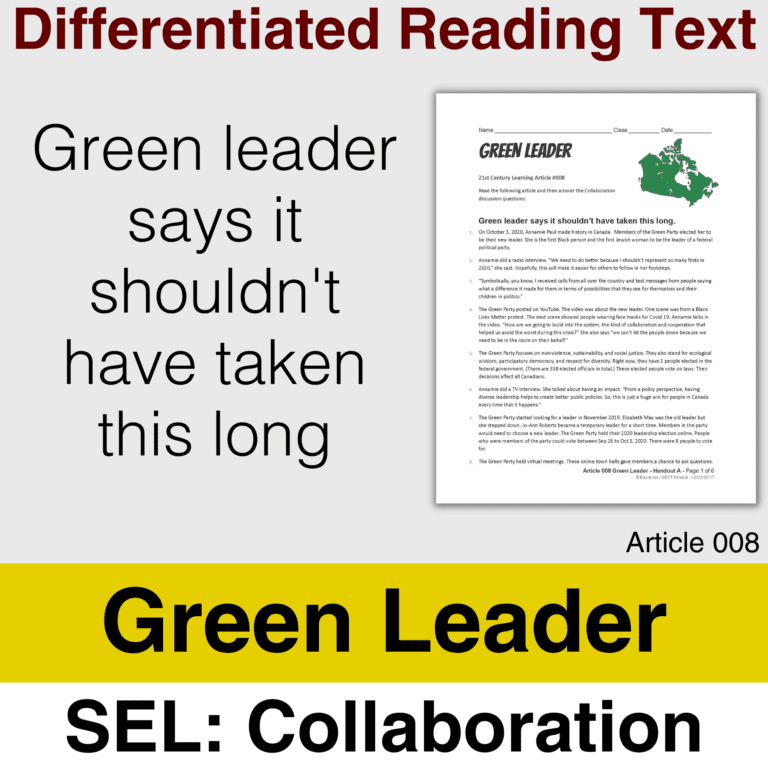Reading response article about CITIZENSHIP and building bridges between police officers and disadvantaged youth.
PK Subban is a professional hockey player. He has been using his position of power to help build bridges between police officers and disadvantaged youth by creating opportunities for the two groups to hang out with each other in positive ways.
The take-away message is that active citizenship means making a positive difference in your community.
We all belong to different communities – our school community, our local community, our country, the world, etc. But, citizenship also means making a positive difference to other groups based on aspects of our identity – gender, race, religion, etc.
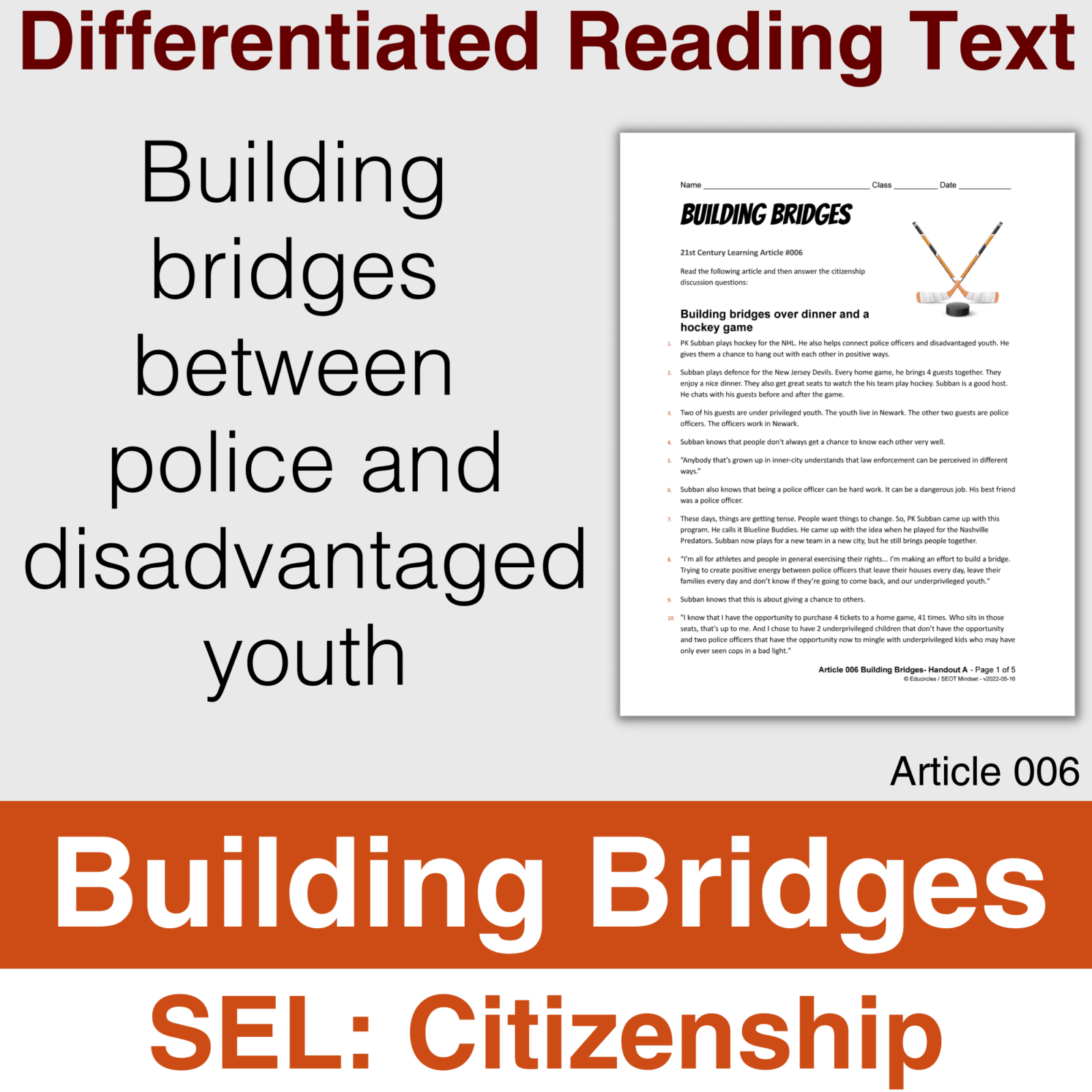
Want to see exactly what you get before you buy this product?
- Watch the PREVIEW VIDEO
- Look at the PREVIEW PDF.
(It is a watermarked version of the entire PDF resource.)
Building bridges over dinner and a hockey game
PK Subban plays hockey for the NHL. He also helps connect police officers and disadvantaged youth. He gives them a chance to hang out with each other in positive ways.
Subban plays defence for the New Jersey Devils. Every home game, he brings 4 guests together. They enjoy a nice dinner. They also get great seats to watch the his team play hockey. Subban is a good host. He chats with his guests before and after the game.
Two of his guests are under privileged youth. The youth live in Newark. The other two guests are police officers. The officers work in Newark.
Subban knows that people don’t always get a chance to know each other very well.
“Anybody that’s grown up in inner-city understands that law enforcement can be perceived in different ways.”
Subban also knows that being a police officer can be hard work. It can be a dangerous job. His best friend was a police officer.
These days, things are getting tense. People want things to change. So, PK Subban came up with this program. He calls it Blueline Buddies. He came up with the idea when he played for the Nashville Predators. Subban now plays for a new team in a new city, but he still brings people together.
“I’m all for athletes and people in general exercising their rights… I’m making an effort to build a bridge. Trying to create positive energy between police officers that leave their houses every day, leave their families every day and don’t know if they’re going to come back, and our underprivileged youth.”
Subban knows that this is about giving a chance to others.
“I know that I have the opportunity to purchase 4 tickets to a home game, 41 times. Who sits in those seats, that’s up to me. And I chose to have 2 underprivileged children that don’t have the opportunity and two police officers that have the opportunity now to mingle with underprivileged kids who may have only ever seen cops in a bad light.”
Of course, one meal and one game together won’t fix all of the world’s problems. But it is a chance to start a conversation.
D’Angelo Bennett, his son and his nephew had dinner and watched a game with local police. Later on, Bennett talked about what happened.
“The boys haven’t stopped talking about this and I think they will look at things differently from now on. Even me, I’m 41, I’ve never sat down and had a conversation with a police officer before. Hell, it changed my view.”
Blueline Buddies also has a positive effect on some police officers. One officer even sent Subban an email.
“I’m going to stay in touch with this kid… we’re going to go to many more games because I got season tickets…”
Citizenship Mini-Lesson
Citizenship is about being a member (or citizen) of a country. But, when we talk about citizenship at school, we’re talking about being an active citizen or good citizenship.
Think about it:
- Just because you are part of a sports team doesn’t mean you are a good teammate.
- Just because you are at school doesn’t automatically mean you are a good student.
- And so, just because you are a citizen does not mean you are automatically a good citizen.
How to be a good citizen
Let’s look at how to be a good team member to figure out how to be a good citizen.
Think about an athlete on a sports team, a musician in a band, or someone involved in a play.
What makes someone a good teammate? Jot down some ideas
- ________________________________________________________________
- ________________________________________________________________
- ________________________________________________________________
Now, look back at some of your answers and challenge your ideas.
Is someone who scores a lot of points in the game automatically a good team member? Can you be a good team member and not score a lot of points?
We are all part of different communities.
Being a good citizen is like being a good teammate. It’s about taking action to make a positive difference in your community.
Think about the communities that you are part of.
- What do you do in class that helps make a positive difference in class?
- What do you do at school that helps make a positive difference at school?
- What do you do outside of school to help make a positive difference in your community?
Background Information
- May 2009: Subban starts playing for the Montreal Canadiens
- September 2015: Subban pledges $10 million donation to Montreal Children’s Hospital
- June 2016: Subban traded to Nashville Predators
- August 2016: San Francisco 49ers quarterback Colin Kaepernick protests anthem over treatment of minorities. A number of NFL players take a knee or stay in the locker rooms in protest. Other athletes in different sports also protest. (source: 2016-present)
- September 2017: PK Subban says he would never take a knee during the national anthem.
- October 2017: Blueline Buddies is in full swing.
- December 2017: Article in the Tennessean:
- “I’m all for athletes and people in general exercising their rights… I’m making an effort to build a bridge. Trying to create positive energy between police officers that leave their houses every day, leave their families every day and don’t know if they’re going to come back, and our underprivileged youth.”
- “The boys haven’t stopped talking about this and I think they will look at things differently from now on. Even me, I’m 41, I’ve never sat down and had a conversation with a police officer before. Hell, it changed my view.”
- October 2018: Blueline Buddies is back.
- January 2018: Subban talks with The Daily Show with Trevor Noah
- “I have the opportunity to purchase 4 tickets to a home game, 41 times. Who sits in those seats, that’s up to me.”
- “I’m going to stay in touch with this kid… we’re going to go to many more games because I got season tickets…”
- January 2019: Blueline Buddies still in the mix.
- June 2019: PK Subban traded to New Jersey Devils
- January 2020: Blueline Buddies (New Jersey)
- January 2020: Blueline Buddies (Tennessee) still going on.
- January 2020: Subban talks with Hip New Jersey:
- “Anybody that’s grown up in inner-city understands that law enforcement can be perceived in different ways”
- March 2020: NHL shuts down the season due to Covid-19
- June 2020: Subban donates $50,000 to fund for George Floyd’s daughter. Convinces the NHL league to match the donation
Reading Comprehension Questions
Based on this citizenship mini-lesson, how would you answer the following questions:
- What communities or groups do you think PK Subban is a part of? (For example, he’s ___. He’s a ___)
- What actions did P.K. Subban do (or not do)? What message might this send? Who might benefit if this message is accepted?
- What do we mean when we talk about building bridges in this article? Which bridges are the hardest to build? Which are the easiest?
- Is this an example of good citizenship? Why or why not?
